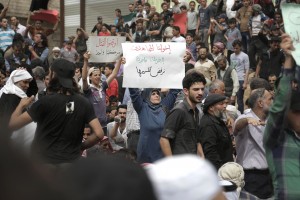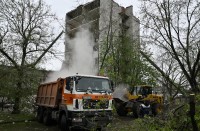
Russia said Tuesday it hoped a new ceasefire could be announced within hours for Syria’s battered city of Aleppo, where fresh fighting left at least 16 dead including in rocket fire on a maternity hospital. (AFP) ABDULMONAM EASSA
UNITED NATIONS, United States (AFP) by Carole LANDRY
The UN Security Council on Tuesday demanded that hospitals and clinics be protected in war zones, in a resolution that draws attention to the rise in attacks on medical workers in conflicts worldwide.
Less than a week after air strikes on a hospital in the Syrian battleground city of Aleppo killed at least 30 people, the council unanimously adopted the measure that strongly condemned the targeting of health facilities and recalled that such attacks are war crimes.
French Ambassador Francois Delattre said it was a “major resolution” that sent a strong warning that there can be “no impunity” for the perpetrators of attacks on medical facilities.
The resolution does not break any new legal ground but British Ambassador Matthew Rycroft stressed that it was “shining a spotlight” on the increase in attacks and serves as a reminder that hospitals, ambulances and medical workers cannot be targets in war.
It was the first-ever resolution adopted by the council specifically on the need to protect medical facilities in war zones.
According to Doctors Without Borders (MSF), there were 94 attacks in Syria against hospitals and clinics supported by that NGO and three MSF-linked health facilities in Yemen have been bombed over the past six months.
Hospitals and clinics in South Sudan have been pillaged repeatedly over the past three years.
“Hospitals and patients have been dragged onto the battlefield,” MSF president Joanne Liu told the council.
“Stop these attacks”, she pleaded. “Make this resolution save lives.”
– ‘Something is deeply wrong’ -The resolution does not name countries, but “demands that all parties to armed conflicts” ensure “the respect and protection” of medical personnel as well as their ambulances, hospitals and other health facilities.
“Such attacks must end,” UN Secretary-General Ban Ki-moon told the council.
“When so-called surgical strikes end up hitting surgical wards, something is deeply wrong.”
The resolution was drafted by five non-permanent Security Council members: Egypt, Japan, Spain, New Zealand and Uruguay.
It was presented at a time when four of the five permanent council members — Britain, France, Russia and the United States — are backing parties in the Syria conflict.
Syria’s state media reported that rebel fire on a hospital in the government-controlled area of Aleppo had killed three women and wounded another 17 on Tuesday.
The vote came days after the United States said its troops involved in the bombing of a MSF-run hospital in the Afghan city of Kunduz would not face war crimes charges.
“Humanity in war is what we demand,” Peter Maurer, president of the International Committee of the Red Cross, told the council.
“Even wars have limits, because wars without limits are wars without ends. Health care personnel are the outer frontier of these limits,” he said.
The resolution requests that Ban present recommendations on measures to prevent attacks and to ensure that those who carry them out are held accountable.







